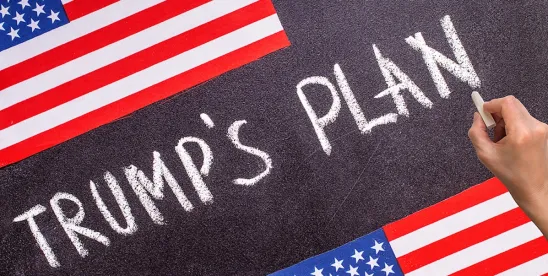Leading up to the U.S. presidential election this November, our Antitrust & Competition team continues to offer insights into what antitrust enforcement may look like under the next presidential administration. In our last post, we analyzed antitrust enforcement under the Biden administration, which highlighted the results of Biden Administration’s aggressive antitrust policies. Under another potential Trump administration, enforcement priorities and agency leadership would be tough to predict. As our guideposts, we will analyze antitrust enforcement under Trump’s first term, 2024 campaign rhetoric, and antitrust priorities laid out in Heritage Foundation’s 2025 Presidential Transition Project (“Project 2025”), with the understanding that former President Trump has disavowed Project 2025.
Antitrust under Trump’s First Term
Although Republican administrations may be known for more business-friendly antitrust policies, the last Trump Administration quickly ramped up antitrust rhetoric and enforcement priorities. Trump’s DOJ sought to break up “Big Tech,” with challenges to major tech deals and the Google monopolization search case (that the DOJ recently won). Trump’s FTC also challenged deals with novel theories of harm and suits against vertical mergers.
Antitrust Rhetoric on the Campaign Trail
While Trump has been relatively silent on antitrust on the campaign trail, his running mate JD Vance has been vocal about aggressive antitrust enforcement. Vance described FTC Chair Lina Khan as “one of the few people in the Biden administration I think is doing a pretty good job” and appreciates how she has a “broader understanding of how we think about competition in the marketplace.” On Big Tech enforcement, Vance believes that Big Tech companies are “too big” and should be broken up. Vance appears positioned to have a role in antitrust policy within a new administration and continue Trump’s tough examination of Big Tech that started in his first term.
Project 2025
Much has been made of Project 2025, a collection of conservative policy plans that potentially would be implemented by a new Trump administration. Project 2025 acknowledges the importance of antitrust enforcement to ensure a competitive economy and expresses some progressive ideas on market concentration, stating that “we are witnessing in today’s markets the use of economic power—often market and perhaps even monopoly power—to undermine democratic institutions and civil society.” Project 2025 partially blames the government for increased market concentration, opining that the “sheer cost of compliance with regulation favors large firms, which can more efficiently spread the cost of regulation over a larger revenue base and have the resources to invest in sophisticated government relations” and calls for the FTC to consider the role of government in maintaining market concentration.
Project 2025 also discusses ways that antitrust enforcers can bolster conservative ideals. For example, Project 2025 calls for FTC investigation into “environmental, social, and governance” (“ESG”) practices that mask anticompetitive activity and unfair trade practices. The plans also call for more cooperation between the FTC and state attorneys general because, the policy states, “state attorneys general are far more responsive to their constituents than is the FTC.” However, the plans also question whether the FTC should continue to enforce the antitrust laws at all.
With a new Trump Administration poised to continue its scrutiny of Big Tech, companies should be apprised of antitrust and competition positions posed by each presidential candidate as we get closer to the election.




 />i
/>i

